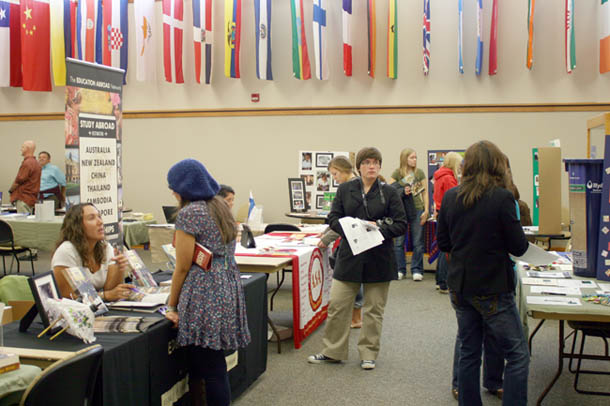NMU students interested in travelling the globe were able to find information on studying abroad at NMU’s study abroad fair.
The fair took place Tuesday Sept. 28. in the Whitman Commons. Study abroad programs set up information boards and had flyers to hand out to interested students. The choices were many—students could travel to England, Greece, India, Thailand, Japan, or other areas to do a variety of different activities, such as travel to visit historical, geographical and religious sites, learn about sustainable communities, and attend a foreign school.
Miriam Moeller, the internal programs specialist in the international programs department, was excited about the student turnout for the fair. It is important for students to participate in a study abroad program, she said

“It’s a resume builder. That’s the first [reason]. It definitely helps students to market themselves better after graduation,” said Moeller. “Students come back from a study abroad, and they’re more independent and more flexible.”
Moeller says rumors that you can’t pay for studying abroad or that it will hold back your graduation date aren’t true. Both Financial aid and scholarships are both available for students to help finance their trip. The international programs department makes sure that the credits transfer, are added to your transcript, and become part of your GPA.
Moeller said it is important to do a study abroad project while in school, when students still have the chance.
“I have talked to people who have graduated school, started a family, gotten a job, and you can’t just take off for six months,” said Moeller. “If you want to have a long term abroad experience or even just a month, study abroad now.”
There were several new programs to the fair this year, including a new faculty led class and a volunteer trip to Belize and Central America. The program Moeller was most excited about though was the Living Routes program. This program offers many different locations, each with a different environmental focus. What is common throughout all the programs offered by Living Routes is the focus on sustainable living. Each location is in an ecovillage, which practices living sustainably with their environment.
Living Routes is not just for environmental science majors though. Gregg Orifici, the Director of Academic Relations and the Head of Development in Costa Rica for Living Routes, said that the program is so broad that other majors easily play a role in their activities.
“It looks at social and cultural issues surrounding sustainability which really touches on all majors,” said Orifici.
Students who participate in the Living Routes program get lots of hands on experience, which is an aspect Living Routes says makes it unique.
“[Students] don’t want to sit in the classrooms anymore,” said Nina Dawe, the Director of Admissions and the program manager in Mexico, Brazil, and Scotland. “They want to get hands on, they want to dig in the earth, and they want to build a clay building, and build a clay oven. They want to talk to the people in the community and help understand what it means to live sustainable.”
Other booths included AustraLearn, a program that allows students to attend an university in Australia, New Zealand, and other locations, Environmental Sciences in Japan, the Education Abroad network which offers programs in many different locations, and many other booths. Also present were booths containing information about the 2011 faculty programs. Faculty programs are classes led by professors who take students to different parts of the world for 4 credits. Some of the places this year include Greece, to study ancient history, Italy, to study art history, Peru, for alternative healing, and Sweden for culture and civilization.
“The study abroad has slowly been going up and I think it is an important thing to do, especially in college,” said Moeller. “Companies are really looking for that kind of capability that you can develop in a study abroad of being more international and involved in worldly things.”























